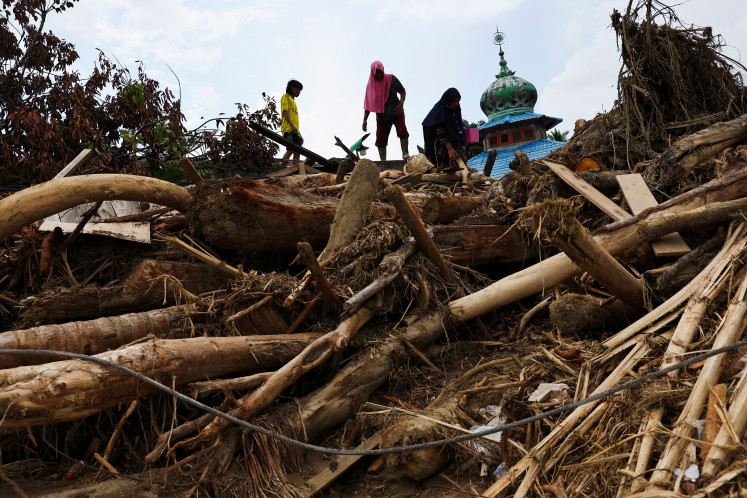Popular Reads
Top Results
Can't find what you're looking for?
View all search resultsPopular Reads
Top Results
Can't find what you're looking for?
View all search resultsEU wants cooperation over sustainable palm oil
Indonesia and the European Union need to further promote cooperation over sustainable palm oil to help ease the tension between Jakarta and Brussels over the latter’s move to phase out the use of crude palm oil in biofuel by 2030, an EU representative has said
Change text size
Gift Premium Articles
to Anyone
I
ndonesia and the European Union need to further promote cooperation over sustainable palm oil to help ease the tension between Jakarta and Brussels over the latter’s move to phase out the use of crude palm oil in biofuel by 2030, an EU representative has said.
“Indonesia wants to produce sustainable palm oil and has a whole set of policies to do that, while the EU wants to consume sustainable palm oil, so our paths are bound to meet between sustainable palm oil production and sustainable palm oil consumption,” the charge d’affaires of the EU delegation to Indonesia, Charles-Michel Geurts, told reporters on the sidelines of the launch of the EU-Indonesia 2019 Blue Book in Jakarta on Tuesday evening.
The European Commission adopted on March 13 a delegated act on sustainability criteria for biofuels, a derivative of its Renewable Energy Directive II (RED II), which has been seen as a protectionist trade policy directed against palm oil.
The commodity is the only one singled out for having a high risk of causing deforestation based on indirect land use change (ILUC), which is calculated by comparing the amount of agricultural land that was meant to produce food but was converted to grow ingredients for biofuel.
“For the moment, we fully understand the worries and concerns or even the indignation of our Indonesian friends because when you talk about palm oil you talk about 17 million people who directly or indirectly depended on palm oil, the commodity that has been a driver to get out of poverty,” Geurts said.
However, he said the delegated act came with many exceptions, used a dynamic revision approach and engaged in real cooperation with Indonesia in various ways, including through studies, sharing data and other projects involving sustainable palm oil.
The legislation is up for review in 2021 and 2023, which is still before the provision takes effect in 2024. The review would examine various policies Indonesia had implemented to produce sustainable palm oil, such as revamping the Indonesian Sustainable Palm Oil (ISPO) system, a moratorium on the new concessions and a policy to replant rather than expand plantations onto new land, he said.
As the largest producer of the commodity, Indonesia objected to the adoption of the legislation, saying that it was discriminatory because other vegetable oils produced in EU countries and the United States — such as soybean, rapeseed and sunflower oils —have lower yields and thus use land more excessively.
Indonesia also argued that the deliberation was made based on outdated 2015 data, claiming that since then the government has made various efforts to establish a sustainable palm oil industry, which include imposing a two-year moratorium on the issuance of new permits to clear rain forests and peat land, as well as a moratorium on new oil palm plantations.
Geurts asserted that the EU did not have “an obsession” over palm oil as a commodity, but rather had a specific approach to deforestation and its drivers, as the bloc was still the second largest market for Indonesia’s palm oil and its consumers wanted a sustainable product.
“For the moment, we see that based on the data from 2015, palm oil stands out,” he said. “Forty-five percent of the expansion of palm oil until 2015 was done at the expanse of primary forest and peat land, the land that captures carbon.”
While more than half of the EU market for palm oil is for food, the EU is “the most important and the only market” that uses palm oil for biofuels because of its objective to have 32 percent of its energy produced by renewable sources by 2030, he said.
However, the new demand for biofuels had caused the expansion of plantations into forests and onto peat land in Indonesia, offsetting biofuel’s low greenhouse emissions.
“We don’t want as the EU to promote deforestation and to promote degradation of peat lands by subsidizing and by heavily supporting biofuels, like we have in the past by creating this huge market,” he said.
The legislation would not have a direct impact on trade. It only means that the European countries’ policy to promote renewable energy through subsidies and tax incentives won’t be applicable to palm oil biofuels.
In the meantime, he said the two sides would meet for the eighth Indonesia-EU Comprehensive Economic Partnership Agreement (IEU-CEPA) in Jakarta in the coming weeks.










